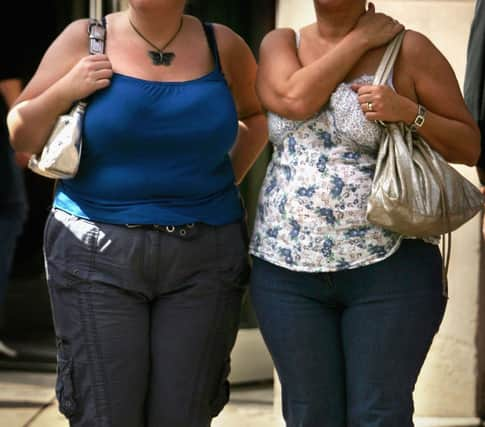Obesity costs Britain more than war and terrorism


The study, commissioned by consultancy firm McKinsey and Company, revealed obesity has the second-largest economic impact on the UK behind smoking, generating an annual loss equivalent to 3 per cent of GDP.
More than 2.1 billion people around the world – or nearly 30 per cent of the global population – are now overweight or obese, with the figure set to rise to almost half of the world’s adult population by 2030, according to the McKinsey Global Institute (MGI), which carried out the research.
Advertisement
Hide AdAdvertisement
Hide AdIt has now called for a “co- ordinated response” from governments, retailers, restaurants and food and drink manufacturers to address the “global obesity crisis”.
A series of 44 interventions could bring 20 per cent of overweight or obese people in UK back to normal weight within five to ten years, the report said.
This would save around £16bn a year in the UK, including an annual saving of about £766 million in the NHS, according to the study.
The report said: “Obesity is a major global economic problem caused by a multitude of factors. Today, obesity is jostling with armed conflict and smoking in terms of having the greatest human-generated global economic impact.”
CONNECT WITH THE SCOTSMAN
• Subscribe to our daily newsletter (requires registration) and get the latest news, sport and business headlines delivered to your inbox every morning
The report found the economic impact from smoking in the UK was £57bn in 2012, or 3.6 per cent of GDP, while the country suffered a £43bn annual loss from armed violence, war and terrorism, or 2.5 per cent of GDP.
In the UK, government efforts to tackle obesity were “too fragmented to be effective”, while investment in obesity prevention was “relatively low given the scale of the problem”.
The UK spends less than £638m a year on obesity prevention programmes – about 1 per cent of the country’s social cost of obesity, the study found.
Advertisement
Hide AdAdvertisement
Hide AdBut the country spends about £6bn a year on the medical costs of conditions related to being overweight or obese and a further £10bn on diabetes, it claimed. Meanwhile, the cost of obesity and diabetes to the NHS is equivalent to the UK’s combined “protection” budget for the police and fire services, law courts and prisons, it added.
The rate of obesity and overweight conditions suggests the cost to the NHS could increase from between £6bn and £8bn in 2015 to between £10bn and £12bn in 2030, the study found.
A Scottish Government spokeswoman said: “We recognise obesity is a serious issue in all age groups and are taking concerted action to make our national diet healthier and help cut Scotland’s high levels of preventable diseases, such as heart disease, cancer and diabetes.
“There is, however, no simple solution. That is why we are leading a range of activities to make it easier for people to adopt healthy habits and be more active, to eat less, and to eat better.”
The recommended interventions to reduce the cost of obesity include portion control in fast food packaged goods and changing the school curriculum to include more physical exercise.
Dr Alison Tedstone, chief nutritionist at Public Health England (PHE), said: “Overweight and obesity is a complex problem which requires action across individual and societal levels involving industry, national and local government and the voluntary sector. There is no single ‘silver bullet’ solution.”
SCOTSMAN TABLET AND IPHONE APPS